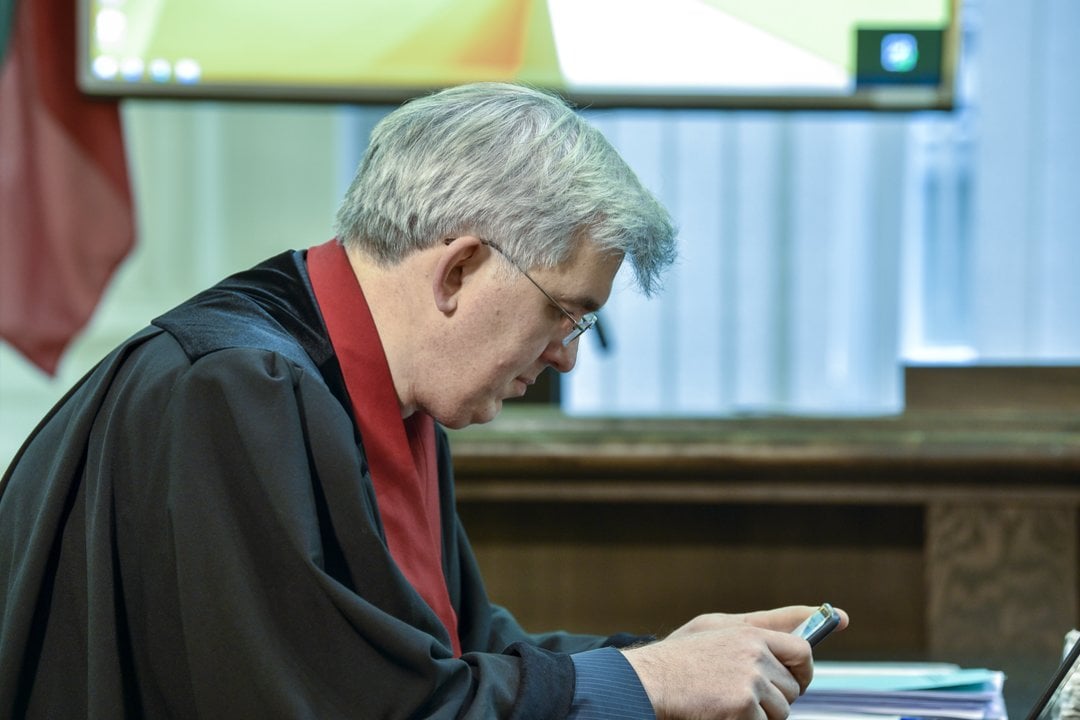Proposes to thank the Government
It is easy to see that the last few years have been chaotic for the Government. Still, Lauras Bielinis says that the public should be grateful for the Government's ability to manage all situations.
„We have to realise that the Government's activities, especially in the last year, have been extremely complicated by external events such as the pandemic, the provocations by Belarus and the consequences of the war in Ukraine. All these external factors have a huge impact, especially on the country's economy and the economy.
Judging by the way we are holding up and holding on to our country now, we can say that (...) we have actually stood up, and the Government should just say 'thank you'. So far, we are actually holding up quite normally“, he said.
Asked, however, whether the Government receives such thanks from its constituents, Bielinis said that this is not the function of this institution. He said that even if the Government does not receive thanks, it should try to meet its objectives.
„In my opinion, the Government does not need to wait for thanks from its voters. The Government has to do what it has to do, ignoring emotions, ignoring political accusations, demands, etc.
There is a programme, there is a budget, and that budget must be implemented as it is planned and implemented efficiently. Then we will simply get a result, which may not be thanked for, but in the final sense, the state will live“, said the VMU professor.
Although Dumbliauskas also praised the governance of the state during the crisis period, he also noted some weaknesses. One of them was the tax reform.
„My greatest sadness, if I may say so, is that I had very high expectations from this Government on tax reform. Unfortunately, the problem with the tax system, to put it popularly, is that we do not all pay equally into the common pot.
The Government has promised to correct this inequality, that some people, especially those who work in public institutions, pay a high percentage, and there is a group of people who pay much less. As I understood from I, the equalisation of this injustice has been postponed and even postponed. Šimonytė is unlikely to be brought to the Seimas in the spring session,“ said Dumbliauskas.
Bielinis agreed that in the current context of war, some reforms might naturally remain in the background but stressed that they should be discussed with the public in any case.
„Military issues are becoming a priority. It is inevitable here, and we have to realise that. The Government must do it, even if it doesn't like it. For this reason (...) some reforms are starting to stall or have not yet been launched – naturally. (...)
I very much agree that many of the reforms are good in principle, technically speaking, but they have not been debated. In this way, society is not prepared for these reforms, and even a very good reform will fail because society will not accept it as a phenomenon because it will not understand it,“ the political scientist said.
A sad scenario for the new party
The second place in the rankings is currently held by the recently founded Democratic Union „Vardan Lietuvos“, which is working in the opposition in the Seimas. It is noticeable that this party's rating is slowly rising: in February, 8.7% of respondents would have voted for this party, while in March, the figure is already almost 11%.
However, even with the good results, Dumbliauskas said that the fate of the party is very interesting. According to him, this situation is reminiscent of Artūras Paulauskas and the New Union.
„The phenomenon of Saul Skvernelis's party is very interesting to me. (...) In my opinion, Saul Skvernelis is repeating the fate of the party of one leader, and here I will remind you of the New Union.
While Paulauskas was popular, the New Union was a party, and now, similarly, this party is the result of Skvernelis' popularity. If Skvernelis's ratings start to fall, that party will evaporate like smoke 100%,“ the political scientist said.
This opinion was echoed by L.Bielinis. He said that there are many more examples of such parties depending on one person.
„Yes, there is a correct algorithm here because many parties in Lithuania were personalistic. This means that if there is a politician's face, there is a political party, and if the face disappears, the party dies. The best example is the Labour Party. When Viktoras Uspaskichas is the centre of attention, when he is on the news, when he is talking, the party's ratings go up. Only when Uspaskich disappears somewhere (...) do the ratings of the Labour Party fall.
The approach to a political party, if it is personalistic, is very dangerous because it depends on a person, on a single face,“ explained the VMU professor.
Asked how to get rid of this personalistic image of the party, Dumbliauskas said that there is a solution, but the Democratic Union „In the Name of Lithuania“ is unlikely to succeed in achieving it.
„Skvernelis should step down, and if there is another chairman and the party maintains the same ratings, this would be solved. (...) Once upon a time, the Homeland Union was inseparable from Vytautas Landsbergis and the Social Democrats from Algirdas Brazauskas.
If the party did not disappear with the change of leader (...), then in this sense, the parties became depersonalised. But the Labour Party and the New Union have not been able to depersonalise from one leader.
I think that „In the Name of Lithuania“ will not be able to depersonalise either because they are a temporary formation of people who want to be in power (a formation, – aut.past). You see how many members Skvernelis has attracted. People feel for a popular leader, and they cling to him because they want to participate in politics, and how else do you participate in politics if not through a popular leader?“ the MRU lecturer said.




